Anne Moretti Visits Burundi’s Forgotten Refugees
- Tuesday, 13 October 2015 08:36
- Last Updated: Tuesday, 13 October 2015 11:08
- Published: Tuesday, 13 October 2015 08:36
- Joanne Wallenstein
- Hits: 8051
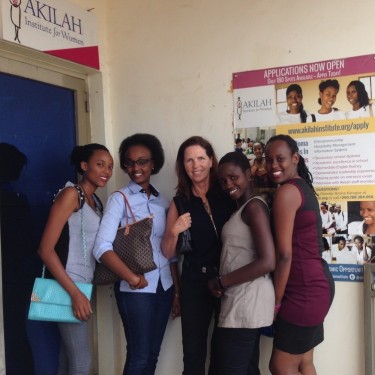 Scarsdale's Anne Moretti fell in love with lions and Africa when she was in grammar school and saw the movie Born Free. She loved the people, the animals and the beautiful landscape of Africa. Over the years, she "became more interested in the African people, the culture, the politics, the feel of the unspoiled earth and the more relaxed way of life."
Scarsdale's Anne Moretti fell in love with lions and Africa when she was in grammar school and saw the movie Born Free. She loved the people, the animals and the beautiful landscape of Africa. Over the years, she "became more interested in the African people, the culture, the politics, the feel of the unspoiled earth and the more relaxed way of life."
She studied African politics at Georgetown, and spent a year in France where she met several medical students from Burundi. She worked with them and constantly discussed politics. She went to Columbia University for my Master's Degree in Economics, hoping to return to Africa (I had spent a summer in southern Africa in 1979). When she didn't get the job at United Nations that she wanted she accepted a job on Wall Street at Irving Trust Company. She needed the money, so she took it. Since she spoke Chinese, she was assigned to cover Asia and her husband to be, Mike Moretti was assigned to cover Africa. Well, since she was interested in Africa, and Mike was too, that all worked out. Mike grew up here in Scarsdale, so they ended up here.
She continued her interest in Eastern Africa over the past 35 years and when her son Luke went to Vanderbilt Anne noticed an article on the University's website about a young Vanderbilt alum named Elizabeth Dearborn-Davis who went to Rwanda and started a college for women.
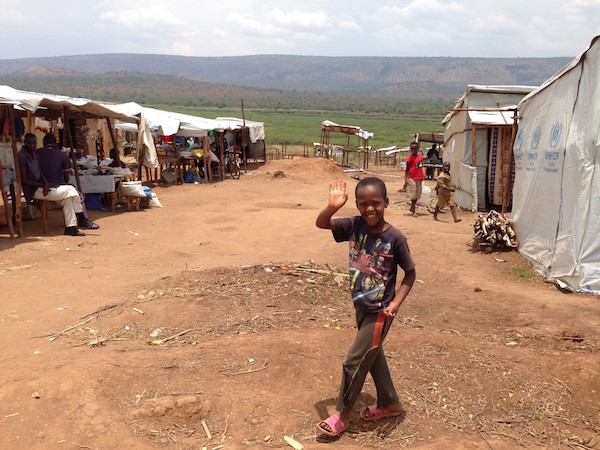 Anne explained, "Ah! I thought, that is what I always wanted to do .... make an impact in an area of Africa which I love and where people are working so hard to make a future for themselves. Elizabeth did that. She is a phenomenon and someone to watch! I am so impressed by her and by the accomplishments of the young women of Akilah a college for woman. Mike and I have been supporters of Akilah (a 501c3 corporation) for the past several years. This year, there is an acute situation due to the political crisis in neighboring Burundi where Akilah's sister campus was forced to close in April due to political unrest and an atmosphere of violence. The girls at that campus ALL want to go to Rwanda to continue their studies. 44 girls have the accreditation needed in Rwanda, and it appears that they are finding host families in Rwanda where they will live. They want to continue their studies at Akilah, in Rwanda, and that requires additional funding."
Anne explained, "Ah! I thought, that is what I always wanted to do .... make an impact in an area of Africa which I love and where people are working so hard to make a future for themselves. Elizabeth did that. She is a phenomenon and someone to watch! I am so impressed by her and by the accomplishments of the young women of Akilah a college for woman. Mike and I have been supporters of Akilah (a 501c3 corporation) for the past several years. This year, there is an acute situation due to the political crisis in neighboring Burundi where Akilah's sister campus was forced to close in April due to political unrest and an atmosphere of violence. The girls at that campus ALL want to go to Rwanda to continue their studies. 44 girls have the accreditation needed in Rwanda, and it appears that they are finding host families in Rwanda where they will live. They want to continue their studies at Akilah, in Rwanda, and that requires additional funding."
You can help these girls graduate college so that they can give back to their families and communities they seek to serve. Here's the link to the fundraiser page:
Moretti recently travelled to Rwanda for two purposes: to visit the school and see what she could do to help the Burundian students who have fled to Rwanda, and to see firsthand what is happening to refugees who have been forced out of their homes in Burundi into camps in Rwanda.
Here is an excerpt from her blog about her trip to Mahama, Rwanda where approximately 44,000 Burundi refugees are being housed.
From Anne's Blog:
As I was preparing to leave, I walked into the dusty white UNHCR (United Nations High Commissioner for Refugees) tent to say a quick goodbye to the camp director.
There were several men, all new arrivals to the camp, sitting quietly on a wood bench along the wall, waiting to be processed into the camp. A twenty-something Burundian woman at the end of the bench stood up as she tried to console a tiny baby wrapped around her slim waist in a traditional African scarf.
Through my interpreter, I asked her how she had come to be here at Mahama. 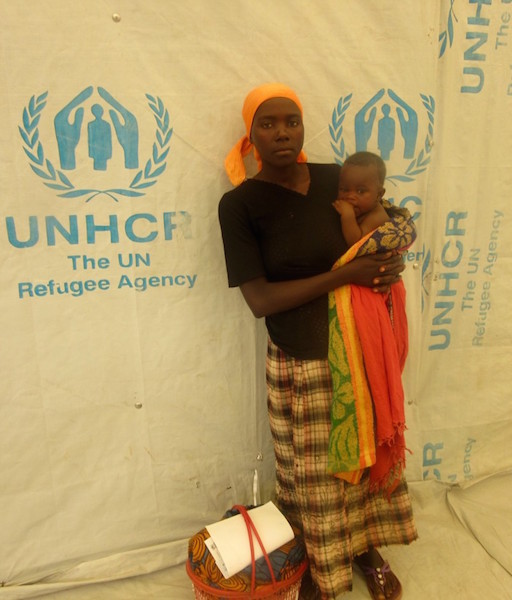 Speaking softly in Kirundi, she said that when the violence began in April, she was too pregnant to travel. Her baby girl was born in May, via C-section, and the father abandoned them at the hospital.
Speaking softly in Kirundi, she said that when the violence began in April, she was too pregnant to travel. Her baby girl was born in May, via C-section, and the father abandoned them at the hospital.
Though she hadn't healed well from the baby's delivery, and she had barely enough money for the bus to take her and her baby across the border into Rwanda, she left Burundi with just a little reed basket which held a few items for her baby. Once they arrived in Rwanda, she paid one of the local moped drivers to transport her over the winding and rutted, red dirt roads to Mahama.
Standing there with dusty sandals and her naked infant daughter wrapped across her chest, she stared at us with big eyes, wide but expressionless. The baby kept crying. I asked if she were nursing, and she said yes, but it was watery, with no milk. I asked if she had eaten, and she shook her head slowly. No, she said, she hadn't eaten for days.
What was shocking to me was not this young mother's story, but that stories like this are so common among the refugees in this camp. Thousands of the residents in Mahama are unaccompanied minors, with no parents, or are young adults traveling alone.
There are farmers and teachers, college students and toddlers stuck here, waiting for order to return to their country. No one I spoke with seemed to think that would happen anytime soon, and there is no talk of returning home for fear of reprisals. Once a person is registered as a refugee, they are viewed suspiciously by the Burundian police, government, and the Inbonerakure.
As the Syrian refugee crisis has pricked the conscience of Western governments into taking action to help these populations, the crisis of Burundian refugeeism has gone largely unnoticed. It began last April when President Nkurunziza announced his intention to run for a third term as president, despite a constitutional two-term limit.
Since then, there has been a huge surge in violence and killings, and over 200,000 Burundians have fled their country fearing persecution amid the threat of political violence. They travel for days, by bus, on bikes, or on foot to cross the borders, headed for refugee camps in neighboring Rwanda, Tanzania, the DRC, and Kenya.
Political persecution, violence, and an atmosphere of 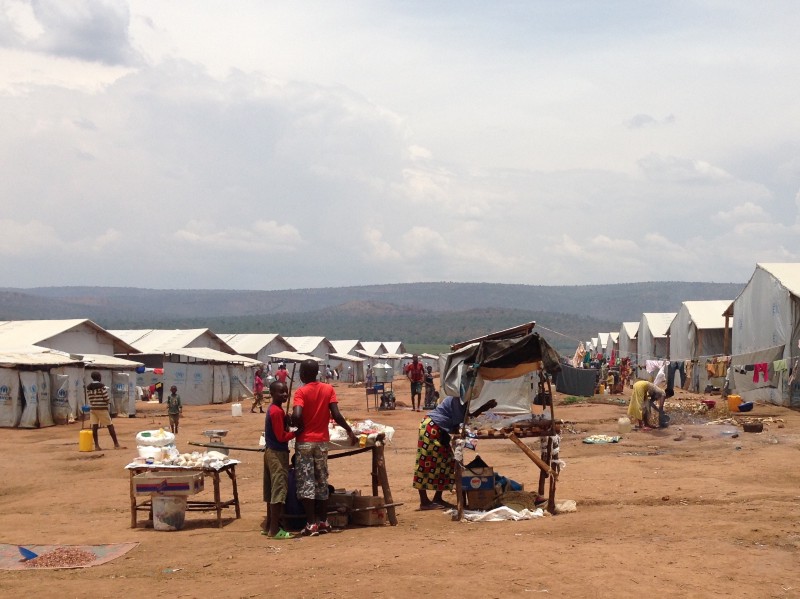 intimidation has ebbed and flowed in Burundi over the past six months, but the absence of any independent news media makes it difficult for outsiders to verify daily reports of police torture and interrogation.
intimidation has ebbed and flowed in Burundi over the past six months, but the absence of any independent news media makes it difficult for outsiders to verify daily reports of police torture and interrogation.
The Inbonerakure, a youth militia armed by Burundi's ruling party, routinely threatens people they accuse of opposing President Nkurunziza. Prior to the July elections, the U.N. stated that any elections held in this climate of widespread intimidation would be considered neither free nor fair. Nonetheless, elections were held and were boycotted by the opposition. President Nkurunziza claimed victory and a mandate for staying another five years in office. Police attacks on citizens, clandestine killings, and widespread fear continue unabated.
Burundi's sister country to the north is Rwanda, with whom it shares a Belgian colonial history and the same ethnic populations of Hutu and Tutsi. Rwanda has worked hard in recent years to overcome its dark history of the 1994 genocide. The country has moved noticeably forward, making encouraging strides in its economy, health services, educational system, roads, and infrastructure.
Burundi, on the other hand, has slid farther into economic decline and continues to rank as one of the world's poorest countries.
In escaping their home country, tens of thousands of Burundians have crossed into Rwanda, where they have been welcomed and assisted, whether in the private homes of friends or the growing refugee camps. These camps have been set up quickly to accommodate the exploding numbers seeking refuge.
I recently visited the largest refugee camp, Mahama, located in Rwanda's Kirehe District (near the Tanzanian border). As of September 30, there were approximately 44,000 Burundian refugees at the camp, with 30-100 more arriving every day.
UNHCR runs the Mahama Camp in conjunction with the Rwandan Ministry of Disaster Management and Refugee Affairs (MIDIMAR). Among the NGOs operating at the Camp, the more visible ones include World Food Programme, Save the Children, American Refugee Committee (ARC), UNICEF, PLAN International, UKAid, and World Vision. Coordinating supplies, NGO activities, and handling the daily care of 44,000 refugees is an enormous undertaking, yet Mahama has organized quickly and prioritized the more important aspects of daily life.
The Camp Director, Aristarque Ngoga, is fully committed to improving life for the refugees. Echoing the sentiments of many Rwandans, Mr. Ngoga expressed the gratitude his country feels towards Burundians in remembrance of their humanitarian assistance to them during the 1994 Genocide.
In addition to refugee camps, many thousands of Burundians have been taken in by Rwandans privately, no matter how meager their financial situation.
Given the worsening political climate in Burundi, Mahama officials are actively preparing for even more refugees. More permanent structures are currently being built to transition the thousands now living in tents to a more stable living environment.
Schools have been set up for the children who study in makeshift classrooms in tents. There is a critical lack of school supplies, but the daily teaching of children in both primary and secondary school is one of the highest priorities at Mahama.
Health-wise, the camp population is not experiencing any serious diseases, and there were reportedly some mild cases of diarrhea and conjunctivitis. The camp works hard to educate the refugee population in sanitation standards to thwart more serious diseases like malaria and cholera.
World Vision recently installed a water filtration system with assistance by UNHCR, UK Aid, and a few other organizations. This has provided camp residents with abundant access to clean water, trucked in from the local Akagera River, just down the hill from the camp.
Food consists of dry grains measured out on a large scale and poured into whatever container a refugee brings to collect the food.
There are orderly queues of refugees every day who wait patiently for rations. The monthly rations of rice, dry maize, corn, and beans are given out with cooking oil to last a month. Weighed out on a scale, amounts are multiplied times the number of people in your family unit.
Life is easier for families with multiple members than individuals living solo in the camp because kitchen sets are more available for larger family units and there are more food options available. Also, in Burundian culture, women do the cooking, so men in refugee camps often find themselves facing new challenges if they arrive alone at a camp or if they are not part of a family unit which includes women. They can be more prone to malnourishment since they don't know how to cook the dry foods they receive. Women are generally supportive, but this can be an issue for some refugees.
While I was there, there were long queues of people waiting for a bar of soap. Another line of women were waiting to pick up sanitary napkins. I viewed the facilities where the grains are stored, including beans, rice, maize and corn. Although supplies are kept clean and orderly, and are well-controlled, there is a serious shortage of nearly every resource, from food to clothing to medicine to educational materials.
Burundian refugees are the forgotten refugees. U.N. assistance and NGOs are spread thin. Outside organizations provide extra supplies, but the camp is in desperate need for additional assistance, especially as the crisis in Burundi continues to worsen.
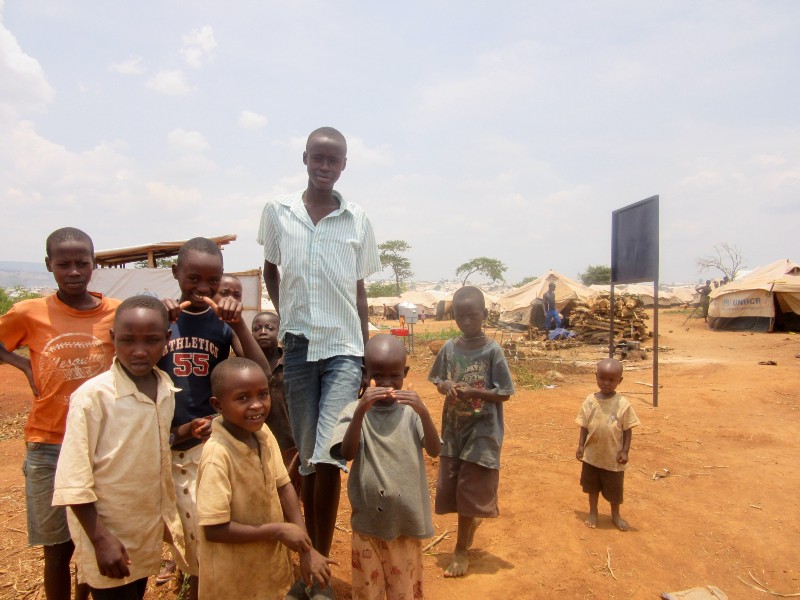 Mahama is also a story of children. Nearly half of the refugees are under 18 years old, and thousands of them are unaccompanied minors.
Mahama is also a story of children. Nearly half of the refugees are under 18 years old, and thousands of them are unaccompanied minors.
Many have travelled alone or with siblings. They have witnessed things that children should never see. While they run through the Camp with a smile on their face and hope in their heart, they are barely surviving on minimal food, and they going to school in tents hoping for a better tomorrow.
At Save the Children, I watched as three guys assembled a wheelchair in a matter of minutes. Many elderly and disabled people are in need of wheelchairs, and only a small fraction have access to them.
Mahama depends on donations of wheelchairs from various organizations. Alfred Twahhirwa, who heads up Save the Children's activities at Mahama, told me how he handles the ongoing need for children's clothing and medical supplies. They keep lists of the most needy, and whenever they receive donations of clothing and other goods from churches and other organizations, the items are distributed to the residents identified as in most urgent need.
There are many young adults at the camp. Before they fled their country, these young men and women worked as nurses, teachers, farmers, and salespeople. Many were attending college.
They want to return to their home and to their lives, but they cannot. None of the refugees I spoke to would ever consider going back to Burundi now, for safety reasons.
They have nothing to do here, but they're creatively trying to move ahead in their lives. An enterprising group created a club at Mahama to learn English. Packed in a tent, the eager students squeezed together on wooden benches as they shared the excitement of learning English.
Burundi is still a French-speaking country and has become isolated in central east Africa for its lack of English-speaking alliances. Rwanda transitioned five years ago, from French to English, and the benefits of tourism and doing business with its Anglo-speaking East African partners have helped the country immensely.
Among the numerous NGOs operating at Mahama, I noticed no French or Belgian organizations, which is curious given those countries' integral connection with Burundi's past.
The cause of Burundi's refugee crisis is identifiable, and the ensuing human tragedy is escalating, but there is little news coverage of these stoic refugees whose daily lives consist of waiting outside of their country in limbo, in a camp that is more like an open prison where they are free to come and go, but there is nothing outside the camps for them. They cannot go home, and they cannot move ahead with their lives.






